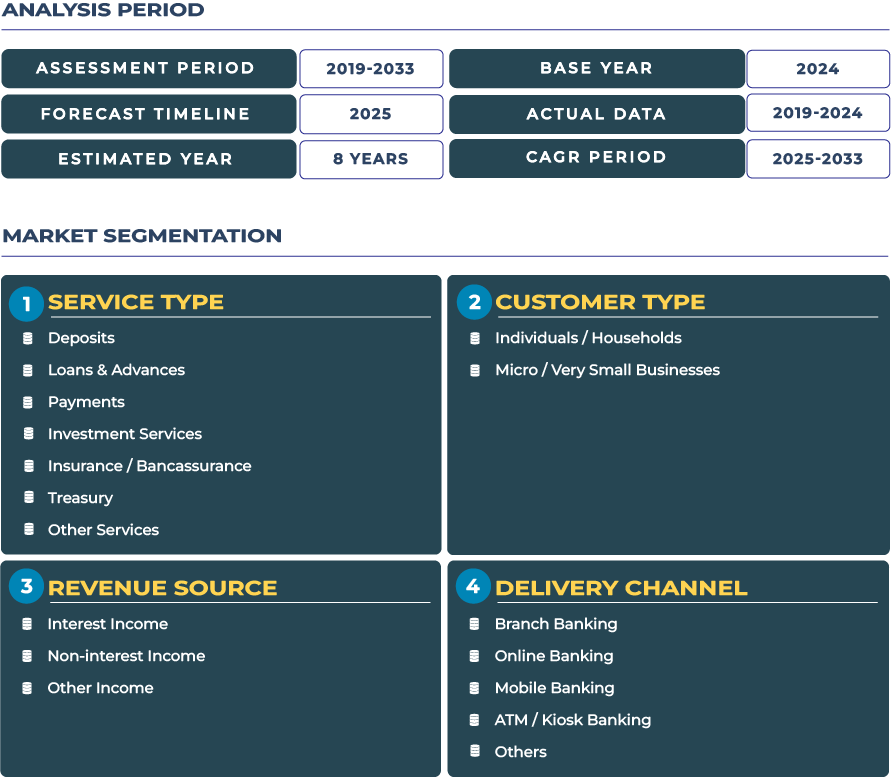Market Outlook: Islamic Digital Banking and Fintech Integration Powering Malaysia Retail Banking Transformation
Malaysia retail banking market is entering a defining phase driven by the rapid rise of Sharia-compliant digital banking and strong government support for fintech integration. With a population that embraces Islamic finance principles, Malaysia has positioned itself as a leading hub for digital Islamic banking innovation in Southeast Asia. The market is estimated at USD 26.4 billion in 2025 and projected to reach USD 43.4 billion by 2033, expanding at a robust CAGR of 6.4% during the forecast period. This growth is supported by increased digital inclusion, regulatory reforms, and strategic initiatives by the Bank Negara Malaysia to encourage fair competition and digital-first banking licenses.
Note:* The market size refers to the total revenue generated by banks through interest income, non-interest income, and other ancillary sources.
The evolution of Malaysia retail banking ecosystem is shaped by rising consumer demand for flexible and Sharia-compliant financial products, coupled with the expanding role of mobile wallets and fintech partnerships. Banks are deploying advanced analytics and embedded finance solutions to personalize offerings while ensuring alignment with Islamic finance principles. The growth of micro-investment products and digital payment solutions has further reinforced the market’s inclusive agenda. Moreover, the introduction of fully digital Islamic banks has redefined customer experience by merging financial compliance with innovation, supporting the nation’s broader vision of a tech-driven and inclusive economy.
Drivers & Restraints: Digital Inclusion and Government Initiatives Catalyzing Sectoral Growth
Government-backed digital banking reforms and the country’s high smartphone penetration-exceeding 95%-are key enablers of Malaysia retail banking growth. The central bank’s framework on digital banks has promoted transparency, competition, and accessibility, allowing new players to offer diversified deposit, payment, and financing solutions. The rollout of 5G infrastructure and rising fintech literacy are further boosting adoption across urban and semi-urban regions. Major cities such as Kuala Lumpur, Johor Bahru, and Penang have witnessed accelerated uptake of mobile banking and digital payment platforms, transforming how individuals and small enterprises manage their finances. In addition, cross-border payment collaborations within ASEAN markets have provided new opportunities for remittance services and trade-linked banking solutions.
However, financial literacy gaps and cybersecurity risks continue to pose challenges in scaling retail banking inclusivity across Malaysia. While the urban population demonstrates strong engagement with digital banking services, rural areas remain underserved due to lower digital awareness and inconsistent connectivity. The increasing reliance on online platforms has also elevated cybersecurity concerns, compelling banks to strengthen risk management frameworks. Another restraint is the cautious lending behavior observed post-pandemic, particularly among micro and small enterprises still recovering from cash flow disruptions. Nevertheless, government financial inclusion programs and targeted awareness campaigns are gradually bridging these gaps, paving the way for balanced market growth.
Trends & Opportunities: Rise of Neobanks and Expansion of Islamic Digital Finance Ecosystem
The rise of neobanks and mobile-first banking models has become one of the most prominent trends in Malaysia retail banking sector. With consumers seeking convenience and speed, leading banks are re-engineering their digital architecture to deliver real-time transaction capabilities and personalized financial tools. Mobile banking apps are integrating lifestyle features such as bill management, e-commerce payment options, and insurance offerings, enhancing customer stickiness. The increasing popularity of QR-based payments and digital wallets is driving the transition toward a cashless economy, particularly in high-density urban centers.
Simultaneously, the expansion of Islamic digital banking platforms offers a major opportunity for sustained growth. New entrants such as Bank Islam Malaysia Berhad and other Sharia-focused institutions are pioneering digital banking ecosystems that cater to both retail and SME customers under ethical finance frameworks. These platforms leverage fintech partnerships to design Sharia-compliant investment products, digital zakat services, and microfinance solutions that enhance accessibility for unbanked populations. The synergy between Islamic finance and technology-driven inclusion aligns perfectly with Malaysia national digital economy blueprint and reinforces the country's position as a global leader in Islamic retail banking innovation.
Competitive Landscape: Strategic Fintech Partnerships and Sharia Compliance Defining Market Leadership
The competitive environment of Malaysia retail banking market is witnessing strategic realignments as traditional and digital-first banks adapt to the new financial paradigm. Major institutions such as Maybank, CIMB Bank, and Bank Islam are leading the transition through robust fintech collaborations and AI-driven risk analytics. In 2024, Maybank expanded its digital footprint by enhancing its MAE app with investment and insurance advisory tools, while CIMB introduced a fully integrated digital loan platform to streamline SME credit access. These moves are complemented by regulatory oversight from Securities Commission Malaysia, ensuring compliance, transparency, and consumer protection in digital financial services.
International banks are also strengthening their market presence by offering Islamic-compliant treasury and cross-border solutions. As digital ecosystems mature, Malaysia retail banking industry is transitioning from traditional transactional models to relationship-based digital engagement. This strategic shift-centered on financial inclusion, technological innovation, and religious compliance-is expected to redefine Malaysia retail banking competitiveness through 2033.







